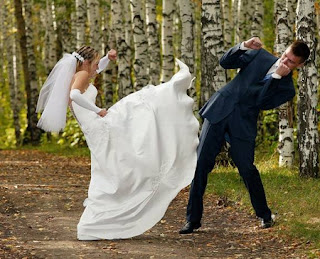“We are expected to go from boy crazy when we
were little, to bridezillas as adult” (Valenti, 2007, p. 131).
This statement is
intriguing for me because I feel that I am included in the construction of
“that the only thing on gals’ minds is marriage” (Valenti, 2007, p.135). I have
to admit that my decision not to pursue a further career in the US that was
“thrown under my feet” is because I want to get married. However, I fully
understand the reward and punishment on my decision, and I have to admit to the
world that I am a “bridezilla” who is obsessed in the fiesta and privilege of
marriage vaganza. Let’s rock on more to this ironic but intriguing discourse on
marriage.

In many cultures,
adult women are expected to get married. The idea of getting married constructs
the individuals to build the social institution. “Bride and groom” and all
those “lalala” jazzy things are a respond to the social norm, values, laws, and
social pressures (Goode, 1982). In construction level, married become a
standard for women and men to pursue the completion of happiness as adults. It
is also a part of building commitment between two individuals who want to live
together.
Now, let’s go to more
pragmatic level of discussion! The economic theory in married leaves the
question of how married, as rational choices, can be an option to individual
become more productive in a shared economic entity rather than being single
(Becker, 1981). Now, the question is, if I can pursue my career that will give
me much more income than when I get married, should I get married?
Fascinatingly, many research also found that the independency of women will
delay the timing of married and the age of women that ever married will be
older (Bloom&Bennett, 1990; Oppenheimer, 1988; and Blossfeld& Huinick,
1991).

A theory called specialization and exchange also argued that superiority
in economic status shrinks the possibility of marriage for women, and as a
consequence of the overall number of marriage rates is declining (Becker,1981).
In his books “New Home Economics”, Becker argued that people marry to maximize
the shared economic benefit and form marriage as a rational choice framework.
Thus, women and men fulfill their “want and need” in terms of economic by
getting married. In his arguments, he conveys two consequences of the theory.
First, higher status women become less attractive because they are less likely
to fulfill the domestic role especially in home production or other attractive
roles. In this statement, I agree with Valenti (2007) when she mentioned that
women in the reality show of the Bachelor are portrayed as stupid, naive,
pathetic, gold digger, do awful things to each other, and “do not give a s***”
on their dignity.” These portrayals of woman are much more attractive to watch
than a smart and elegant woman who has high value to her self. Second, the
higher status women also get less benefit from marriage. This theory suggests
the gender relationship and roles related closely with economic status and
marriage, or often named the “independence hypothesis.” If I am independent,
have high status in the economy, and smart, why should I get married?

Therefore, marriage
that previously prominent in normative and pragmatic reasons, in the
contemporary era, marriage can be seen only as a normative respond, if one
cannot find any benefit of married in economic. No, wait! I am not trying to
argue that I will not get married. However, I have to admit, the idea of married
and career is a “hard food” to “chew and swallow” in my personal decision. I
know that my financial condition now can make me independent enough, even
better than get married. However, there are many other theories beyond economic
and normative. I call it pragmatic love. I’m just drowning in the abundant love
that I terribly missed, when I am thousand miles away from my love one. I just cannot
wait any longer to embrace my own standard of happiness that may be different
with other girls who think that career should be the first. I may be included
in the naive bridezilla. However, I
construct my own happiness, not because of mass media standard. I construct my
standard of happiness based on my own field of experiences, future hopes, and
frame of references, and I am happy with it.

Finally, I can say
that I am a bridezilla who want to enjoy the marriage-Vaganza, because I
believe in my normative value and commitment. I decide it, (for now) not
because of any social constructions, pressures, or punishment to force me, but
because I am pursuing my happiness that cannot be measured by any economic
value, and I called it as “love.” As a human being, who identify my gender role
in feminism values, I feel comfortable to choose to get marriage and take
another chance for other career because,
“When a woman and man
have promised to give each other love, to be mutually supportive, to bring
together care, commitment, knowledge, respect, responsibility, and trust, even
if there are circumstances of inequality, no one uses that difference to
enforce domination” (Hooks, 2004, p. 177).
I do not feel any
domination of my partner or either way. We are happy, even though we may not as
rich as when we are apart as individuals. We just believe to be together now,
perhaps a little bit poor, but at least two souls can be gathered as one. No
more worry to look for another, and feel lonely. Perhaps it is too naive. But
that is me, and I am happy about it.
Research ideas:
1. Research about the construction of marriage in different countries.
2. Research about the language people use to categorize those who are not marriage, such as spinster, leftover women, miss. cheesy, etc.
3. What about the gay marriage issue and the utterances about this issue in digital media such as blogs, online forums, and facebook?


